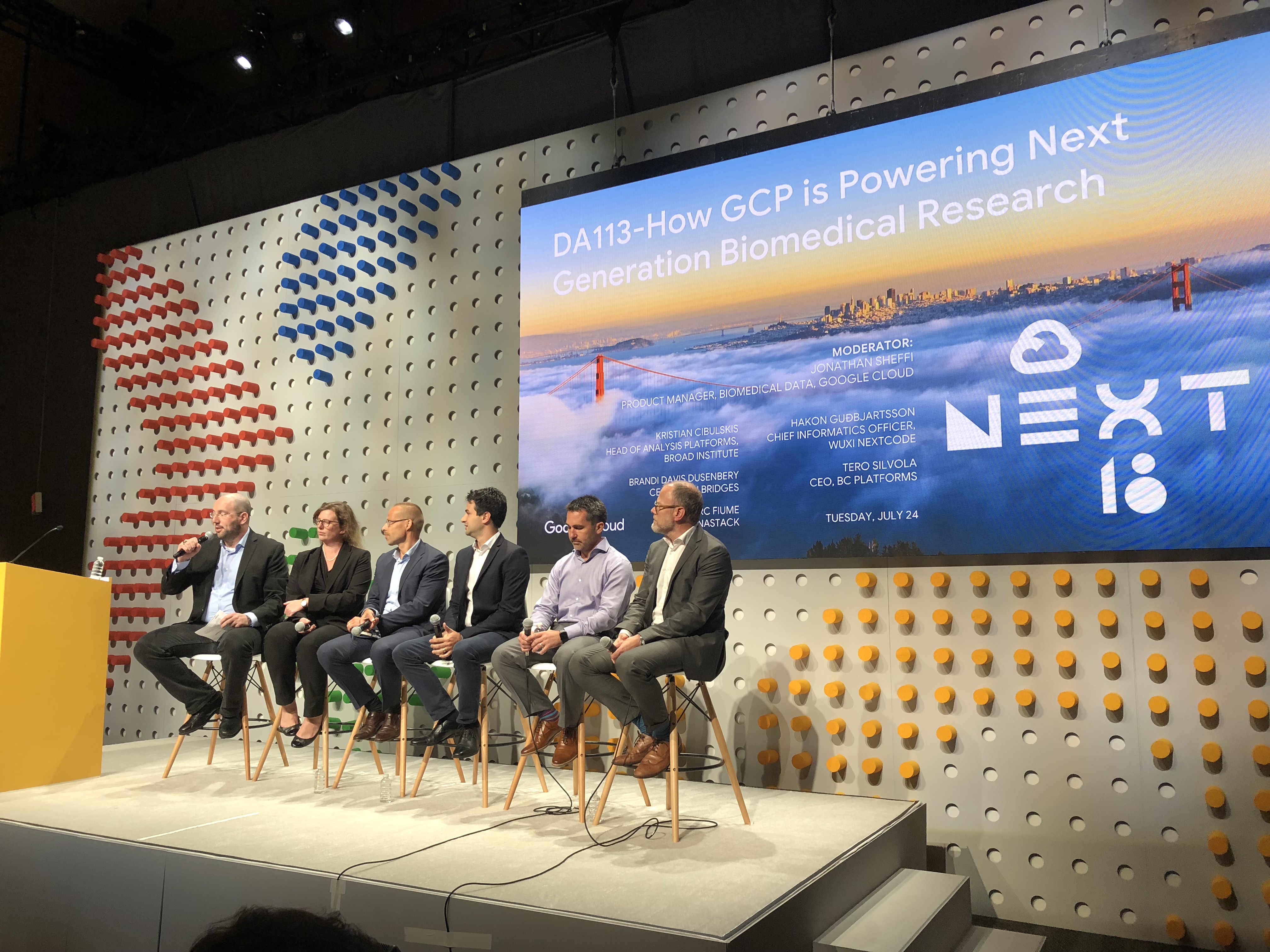Recently, there has been a lot of emphasis on secure data sharing, with the onset of GDPR and the rise of precision medicine. BC Platforms continues to have an important role as genomic data becomes more prevalent in the research and clinical setting.
At the Google NEXT conference this week, several leaders in the field of genomic data handling came together to discuss the current challenges facing the use of genomic data in research and healthcare as cloud-based technology evolves and enables scaled analytics. Amongst these industry leaders, BC Platforms’ CEO Tero Silvola weighed in on a panel led by Jonathan Sheffi, an industry veteran and expert who asked the panel key questions about their companies and industry trends. Chronicled below are some key excerpts from this discussion:
- Pharma is largely challenged with developing targeted compounds to respond to the rapidly changing field and answer needs of aging populations with evolving rare diseases. Despite the challenges that exist, there is a big opportunity for technology to swoop in and address the gaps, whether in the prediction space, diagnostics or in drug development. As the cost of sequencing continues to decrease, more data is aggregated in different silos. In some respects, scientists are spending time trying to be software engineers and software engineers are doing the work of scientists. There is a need for better standardization and interpretation of this data to make it more actionable and increase the utility of genomics and real-world data. Once these barriers are surmounted, the technology that rapidly is developing will enable experts in various fields to come together and deliver on the promise of precision medicine.
- In terms of clinical applications of real world data, the field still has a way to go. The goal is to eventually incorporate genomic data into the clinical workflow so that it can be dissected and physicians can use it to make tailored treatment decisions. The promise of precision medicine takes hold as a field shift towards the democratization of data increases the utility of genomic data. Countries all over the world are starting precision medicine initiatives to collect population data, such as the AllofUs project at a scale of 1 million people in the US. However, with this field transition comes some skepticism over the security of this data. From an insider’s perspective, CEO of BC Platforms Tero Silvola notes that these large-scale data collection projects have already demonstrated a shift in the data sharing mentality. The projects are happening around an orientation to return conclusions on personalized health back to citizens who participate, realizing precision medicine by integrating with healthcare programs.
- Cloud based storage systems for genomic data are rapidly overcoming industry apprehension as the volume of data generated increases and the need for an efficient storage system becomes clear. Security frameworks are driving the adoption of data in the cloud. Additionally, data storage hybrid models such as BC Platforms, offering both on premise and cloud-based storage, quell doubt as successful projects emerge and hubs such as the Montreal Data Center are formed.
In summary, insights from Google NEXT suggest a major shift towards real world data applications in the healthcare space at an affordable level. As Tero Silvola states, “we are all assisting pharma as technology competes with homemade systems. The harmonization of data is critical and difficult to do. [BC Platforms is uniquely positioned], as we have 20 yrs experiencing harmonizing both research and clinical data.” In line with the industry trends, BC Platforms provides a solution to process raw data all the way through to actionable insights for healthcare professionals. This solution runs on cloud with modular outside tools and integration of deep variants. It is a unique tool that enables healthcare institutions in one platform to harmonize raw sample data as well as manage and store genomic information to find the right insights and deliver more actionable reports.
Partnering with Google, BC Platforms’ mission is to assist in the interoperability of data and enable precision medicine with a unique skillset. Google’s new partnership with the NIH has accelerated the shift towards data democratization in building a “global biomedical data ecosystem” and hosting high value data in the cloud. BC Platforms provides modular solutions, allowing customizable technology that aligns with this shift in the field and helps make precision medicine a reality.
For a full recording of the panel discussion summarized in this post, click here.





